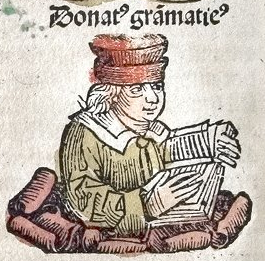Aelius Donatus facts for kids
Aelius Donatus was an important Roman teacher and writer. He lived around the middle of the 300s AD. He taught grammar and how to speak well (rhetoric). One of his famous students was Jerome, who later became a saint.
Contents
What Aelius Donatus Wrote
Aelius Donatus wrote several important books. Some of them are still available today.
Books on Latin Grammar
- Ars maior: This was a detailed book about Latin grammar. It helped people understand how the Latin language worked.
- Ars minor: This book explained the different parts of speech in Latin, like nouns, verbs, and adjectives. It was very popular for teaching Latin to students.
Life Story of Virgil
- Vita Vergili: This book was a biography, or life story, of the famous Roman poet Virgil. It's believed to be based on an older, lost book by another writer named Suetonius. Later, other writers added more details to Donatus's version.
Ideas About Writing and Plays
Donatus also had important ideas about writing and plays.
- He supported an early way of using punctuation. This system used dots placed at different heights to show how long you should pause when reading. It was a bit like our modern comma, colon, and full stop. This system was used for a long time.
- In one of his writings, Donatus was the first person known to describe how a play is usually made of three main parts:
- The protasis: This is the beginning, where the story starts and the main problem is introduced.
- The epitasis: This is the middle part, where the story develops and the characters face challenges.
- The catastrophe: This is the end, where the main problem is resolved, often with a big event.
It's important not to confuse Aelius Donatus with Tiberius Claudius Donatus. Tiberius Claudius Donatus lived about 50 years later and also wrote a commentary on Virgil's Aeneid.
The "Augmented Donatus"
During a time called the Renaissance, people really liked Donatus's Vita Vergili. Scholars added more details and stories to it to make it more complete. These added parts are called Donatus auctus which means "the augmented Donatus" or "the expanded Donatus."
This expanded version of Virgil's life story became the standard one for many years. It showed Virgil as a very smart scholar and scientist. It didn't include the magical stories about Virgil that were popular in the Middle Ages.
The "Sic Vos Non Vobis" Poem
The Donatus auctus also includes a famous short poem called "sic vos non vobis." This poem means "thus you (labor), but not for yourselves."
The story behind this poem is interesting:
- The poet Virgil supposedly wrote a short poem praising Augustus, the Roman Emperor. He wrote it anonymously on the Emperor's palace gate.
- Augustus wanted to know who wrote it.
- A less talented poet named Bacillus claimed he wrote it.
- Augustus asked Bacillus to finish the poem, but Bacillus couldn't.
- Then, Virgil stepped forward and completed the poem, proving he was the true author.
See also
 In Spanish: Elio Donato para niños
In Spanish: Elio Donato para niños
 | Lonnie Johnson |
 | Granville Woods |
 | Lewis Howard Latimer |
 | James West |


